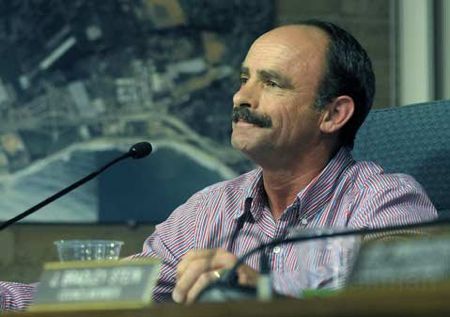The citizens of Carpinteria successfully defeated Venoco’s oil-drilling initiative in Tuesday’s election:

Measure J lost big: Of 3,262 votes cast, there were 2,284 “No” votes (70%) and only 978 “Yes” votes (30%). The Gulf oil spill was a factor, obviously; Carpinterians still remember the 1969 wellhead blowout that fouled local beaches for more than a year. With the benefit of hindsight, I’m sure Venoco CEO Tim Marquez wishes he’d picked a different time to try to get Carpinteria voters to set aside local oversight and grant his company carte blanche.
Even without the Gulf disaster, though, I think Measure J would have lost. It might have been able to get 40% of the vote, and maybe even 45%, but I don’t think it could have reached 50%. Among informed voters Venoco started off way behind; we saw that clearly in the No on J campaign. The company’s only hope was to dramatically outspend us (which it did; Venoco spent about $600,00, compared to about $80,000 spent on our side), and hope it could pick up most of the late deciders. But amidst all the news about oil-soaked beaches, undecideds broke the other way. Live by the low-information voter, die by the low-information voter.
One aspect of Venoco’s campaign that was particularly interesting to me was the company’s repeated charge that the No on J campaign was lying. Venoco wasn’t able to make that charge stick, mainly because it wasn’t true; it was Venoco that consistently made misleading statements, statements that were routinely knocked down, in accurate and devastating detail, in the letters section of the Coastal View News, our local paper.
I heard a story (third-hand, so I don’t know how accurate it is) that in the wake of Measure J’s defeat, Gary Dobbins, publisher of the Coastal View, has been threatened with lost advertising from pro-Venoco business interests unhappy with the paper’s coverage. From my perspective, though, the Coastal View did an admirable job throughout the campaign, and served its readers really well — not by slanting its coverage, but simply by doing what a newspaper should do: reporting the facts. It’s just that in this case, the facts had a strong anti-Venoco bias.
A few days before the election, Venoco distributed a faux “newspaper” called Carpinteria Coastal Preservation News. I haven’t seen a copy, but others in the No on J campaign who have say it looks a lot like the Coastal View — misleadingly so. One thing the mock newspaper did that particularly incensed many in the No on J campaign was to accuse our side of engaging in a Nazi-style “Big Lie.” No on J volunteer Niels Johnson-Lameijer wrote in his blog:
Taking a closer look at their publication a quote on page 5 caught my eye. It is a quote by Adolf Hitler’s Propaganda Minister J. Goebbels: “If you tell a lie big enough and keep repeating it, people will eventually come to believe it.” Venoco Inc. states a little further: “Opponents of Measure J seem to have perfected this technique to such an extent that even J. Goebbels would have been proud.”
As you may know I am Dutch, and my home country (the Netherlands) was occupied by Goebbels’ Nazi-regime from April 1940 to May 5, 1945. All of my grandparents fought in the resistance and I grew up hearing first hand WWII stories. We all know about the terror the Germans spread over Europe and I can tell you it has left deep marks on Dutch society that are still visible now, almost 70 years after the first Germans marched into the Netherlands.
I am sad to say that with comparing their opponents with one of the masterminds behind the Nazi’s Holocaust, Venoco Inc. has crossed a line, a line I never thought they would even come near. I don’t know who is responsible for comparing the “No on Measure J”-voters to a regime that resulted in an estimated of 50-70 millions deaths and millions more people severely traumatized, but I suggest they pay a visit to the Ann Frank Museum in Amsterdam. This will for sure help give them a little more perspective.
Ultimately, I think Venoco overplayed its hand with the whole “the other side is lying” angle. Maybe the company’s strategists felt they didn’t have any choice, but the reality is that many of the most prominent people in the No on J campaign have reputations in Carpinteria for honesty and fair-mindedness. Former mayor Donna Jordan came out of retirement to fight Measure J. So did former mayor Dick Weinberg. Current mayor Gregg Carty, a lifelong Carpinterian whose family has strong ties to Venoco, such that many of them publicly supported Measure J, nevertheless elicited gasps of surprise from the crowd attending a packed City Council meeting in February when he announced that after careful consideration, he was encouraging the public to vote against the initiative.

Donna Jordan, Dick Weinberg, and Gregg Carty are three of the most honest people I’ve ever met. They have demonstrated — for decades in some cases — that they are willing to listen to all sides of an issue, set their own interests aside, and make the decision that they honestly believe is in the best interests of Carpinteria.
I live in a small town. In some ways it feels like a throwback to an earlier time, which can be both good and bad. But one of the good things about it is that people here tend to relate to each other as individuals. We know Donna Jordan, Dick Weinberg, and Gregg Carty. We know them not as public figures, but as neighbors. We know their character.
These are the people Venoco was calling liars. Maybe that could have worked in a big city, but I don’t think it was ever going to work here.



